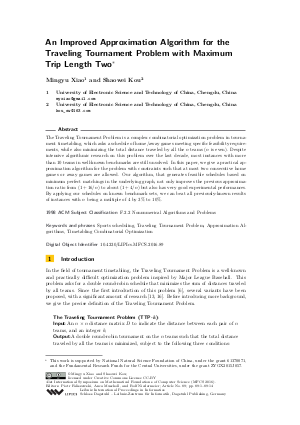An Improved Approximation Algorithm for the Traveling Tournament Problem with Maximum Trip Length Two
Authors Mingyu Xiao, Shaowei Kou
-
Part of:
Volume:
41st International Symposium on Mathematical Foundations of Computer Science (MFCS 2016)
Part of: Series: Leibniz International Proceedings in Informatics (LIPIcs)
Part of: Conference: Mathematical Foundations of Computer Science (MFCS) - License:
 Creative Commons Attribution 3.0 Unported license
Creative Commons Attribution 3.0 Unported license
- Publication Date: 2016-08-19
File

PDF
LIPIcs.MFCS.2016.89.pdf
- Filesize: 0.57 MB
- 14 pages
Document Identifiers
Subject Classification
Keywords
- sports scheduling
- traveling tournament problem
- approximation algorithms
- timetabling combinatorial optimization
Metrics
- Access Statistics
-
Total Accesses (updated on a weekly basis)
0Document
0Metadata
Abstract
The Traveling Tournament Problem is a complex combinatorial optimization problem in tournament timetabling, which asks a schedule of home/away games meeting specific feasibility requirements, while also minimizing the total distance traveled by all the n teams (n is even). Despite intensive algorithmic research on this problem over the last decade, most instances with more than 10 teams in well-known benchmarks are still unsolved. In this paper, we give a practical approximation algorithm for the problem with constraints such that at most two consecutive home games or away games are allowed. Our algorithm, that generates feasible schedules based on minimum perfect matchings in the underlying graph, not only improves the previous approximation ratio from (1+16/n) to about (1+4/n) but also has very good experimental performances. By applying our schedules on known benchmark sets, we can beat all previously-known results of instances with n being a multiple of 4 by 3% to 10%.
Cite As Get BibTex
Mingyu Xiao and Shaowei Kou. An Improved Approximation Algorithm for the Traveling Tournament Problem with Maximum Trip Length Two. In 41st International Symposium on Mathematical Foundations of Computer Science (MFCS 2016). Leibniz International Proceedings in Informatics (LIPIcs), Volume 58, pp. 89:1-89:14, Schloss Dagstuhl – Leibniz-Zentrum für Informatik (2016)
https://doi.org/10.4230/LIPIcs.MFCS.2016.89
BibTex
@InProceedings{xiao_et_al:LIPIcs.MFCS.2016.89,
author = {Xiao, Mingyu and Kou, Shaowei},
title = {{An Improved Approximation Algorithm for the Traveling Tournament Problem with Maximum Trip Length Two}},
booktitle = {41st International Symposium on Mathematical Foundations of Computer Science (MFCS 2016)},
pages = {89:1--89:14},
series = {Leibniz International Proceedings in Informatics (LIPIcs)},
ISBN = {978-3-95977-016-3},
ISSN = {1868-8969},
year = {2016},
volume = {58},
editor = {Faliszewski, Piotr and Muscholl, Anca and Niedermeier, Rolf},
publisher = {Schloss Dagstuhl -- Leibniz-Zentrum f{\"u}r Informatik},
address = {Dagstuhl, Germany},
URL = {https://drops.dagstuhl.de/entities/document/10.4230/LIPIcs.MFCS.2016.89},
URN = {urn:nbn:de:0030-drops-64976},
doi = {10.4230/LIPIcs.MFCS.2016.89},
annote = {Keywords: sports scheduling, traveling tournament problem, approximation algorithms, timetabling combinatorial optimization}
}
Author Details
References
-
Aris Anagnostopoulos, Laurent Michel, Pascal Van Hentenryck, and Yannis Vergados. A simulated annealing approach to the traveling tournament problem. Journal of Scheduling, 9(2):177-193, 2006.

-
Rishiraj Bhattacharyya. A note on complexity of traveling tournament problem. Optimization Online, 2009.

-
Robert Thomas Campbell and DS Chen. A minimum distance basketball scheduling problem. Management science in sports, 4:15-26, 1976.

-
Dominique de Werra. Some models of graphs for scheduling sports competitions. Discrete Applied Mathematics, 21(1):47-65, 1988.

-
Luca Di Gaspero and Andrea Schaerf. A composite-neighborhood tabu search approach to the traveling tournament problem. Journal of Heuristics, 13(2):189-207, 2007.

-
Kelly Easton, George Nemhauser, and Michael Trick. The traveling tournament problem: description and benchmarks. In 7th International Conference on Principles and Practice of Constraint Programming, pages 580-584, 2001.

-
Kelly Easton, George Nemhauser, and Michael Trick. Solving the travelling tournament problem: a combined integer programming and constraint programming approach. In 4th International Conference of Practice and Theory of Automated Timetabling IV, pages 100-109, 2003.

-
Nobutomo Fujiwara, Shinji Imahori, Tomomi Matsui, and Ryuhei Miyashiro. Constructive algorithms for the constant distance traveling tournament problem. Practice and Theory of Automated Timetabling VI, pages 135-146, 2007.

-
Marc Goerigk, Richard Hoshino, Ken Kawarabayashi, and Stephan Westphal. Solving the traveling tournament problem by packing three-vertex paths. In Twenty-Eighth AAAI Conference on Artificial Intelligence, pages 2271-2277, 2014.

-
Richard Hoshino and Ken Kawarabayashi. The linear distance traveling tournament problem. In Twenty-Sixth AAAI Conference on Artificial Intelligence, pages 1770-1778, 2012.

-
Richard Hoshino and Ken-ichi Kawarabayashi. An approximation algorithm for the bipartite traveling tournament problem. Mathematics of Operations Research, 38(4):720-728, 2013.

-
Shinji Imahori, Tomomi Matsui, and Ryuhei Miyashiro. A 2.75-approximation algorithm for the unconstrained traveling tournament problem. Annals of Operations Research, 218(1):237-247, 2014.

-
Graham Kendall, Sigrid Knust, Celso C Ribeiro, and Sebastián Urrutia. Scheduling in sports: An annotated bibliography. Computers &Operations Research, 37(1):1-19, 2010.

-
Andrew Lim, Brian Rodrigues, and X Zhang. A simulated annealing and hill-climbing algorithm for the traveling tournament problem. European Journal of Operational Research, 174(3):1459-1478, 2006.

-
Ryuhei Miyashiro, Tomomi Matsui, and Shinji Imahori. An approximation algorithm for the traveling tournament problem. Annals of Operations Research, 194(1):317-324, 2012.

-
Rasmus V Rasmussen and Michael A Trick. Round robin scheduling-a survey. European Journal of Operational Research, 188(3):617-636, 2008.

-
Clemens Thielen and Stephan Westphal. Complexity of the traveling tournament problem. Theoretical Computer Science, 412(4):345-351, 2011.

-
Clemens Thielen and Stephan Westphal. Approximation algorithms for TTP(2). Mathematical Methods of Operations Research, 76(1):1-20, 2012.

-
Michael Trick. Challenge traveling tournament instances. Online reference at http://mat. gsia. cmu. edu/TOURN/, 2013.

-
Pascal Van Hentenryck and Yannis Vergados. Population-based simulated annealing for traveling tournaments. In Twenty-Second AAAI Conference on Artificial Intelligence, pages 267-272, 2007.

-
Stephan Westphal and Karl Noparlik. A 5.875-approximation for the traveling tournament problem. Annals of Operations Research, 218(1):347-360, 2014.

-
Daisuke Yamaguchi, Shinji Imahori, Ryuhei Miyashiro, and Tomomi Matsui. An improved approximation algorithm for the traveling tournament problem. Algorithmica, 61(4):1077-1091, 2011.

